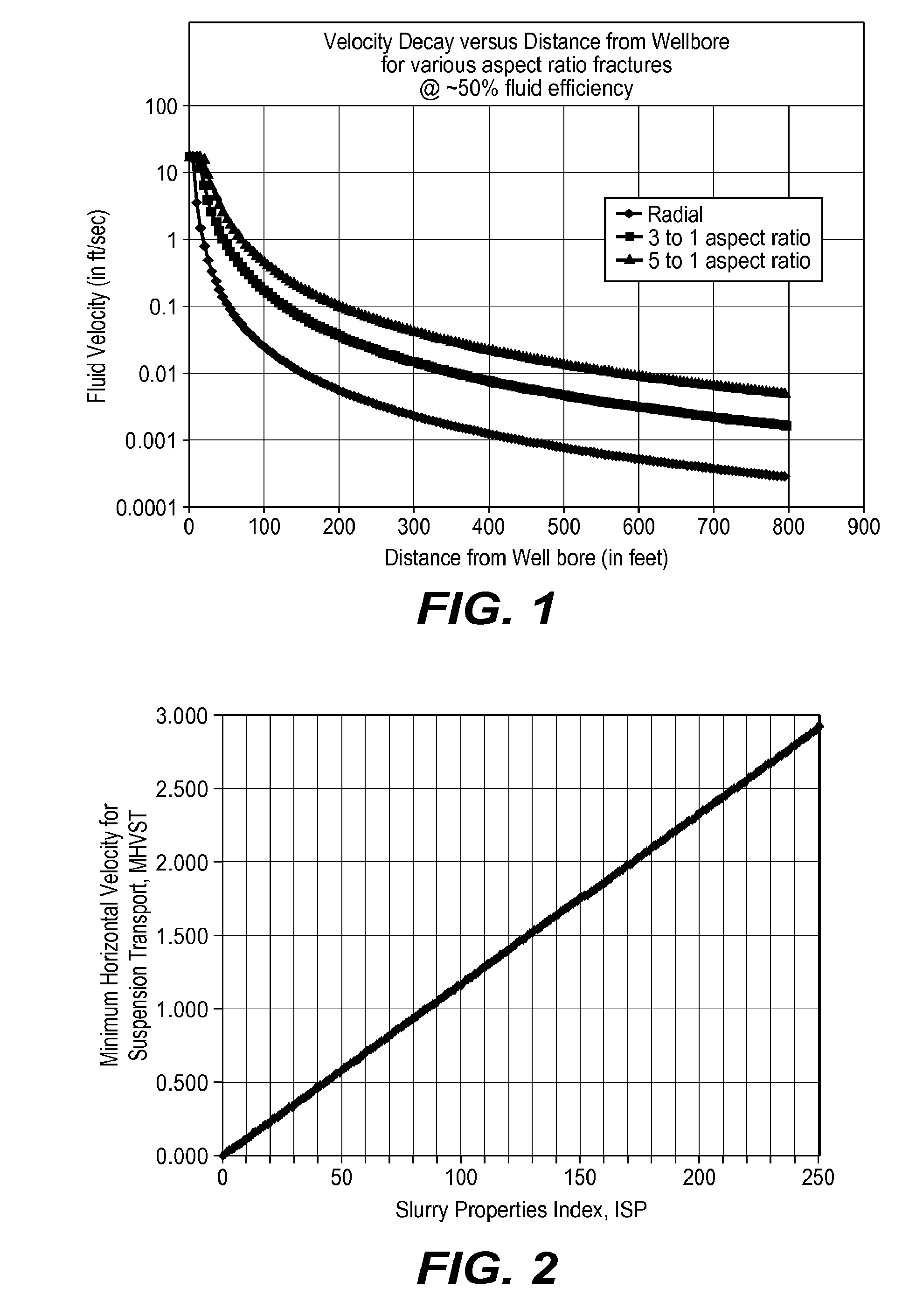Method of fracturing a subterranean formation at optimized and pre-determined conditions
- Summary
- Abstract
- Description
- Claims
- Application Information
AI Technical Summary
Benefits of technology
Problems solved by technology
Method used
Image
Examples
example 1
[0095]The distance a transport fluid containing a proppant comprised of 20 / 40 ULW proppant having an specific gravity of 1.08 and 29 cP slickwater would be transported in a fracture having a 3:1 length to height geometry with a 1 bpm / ft injection rate was obtained by first determining the minimum horizontal velocity, MHVST, required to transport the proppant in the slickwater:
MHVST=CTRANS×(d2prop)×(1 / μfluid)×(ΔSGPS);
or
MHVST=(1150)×(CTRANS)×(0.5810)×(1 / 29)×(1.08−1.00)=0.022 ft / sec.
The distance was then required by as follows:
DPSTB=MHVST / A
wherein A for a 3:1 length to height geometry is 5261.7 and B is −2.2412; or
DPST−2.2412=0.022 / 5261.7;
DPST=251 ft.
example 2
[0096]The distance a transport fluid containing a proppant comprised of 20 / 40 Ottawa sand and 7 cP 2% KCl brine would be transported in a fracture having a 3:1 length to height geometry with a 1 bpm / ft injection rate was obtained by first determining the minimum horizontal velocity, MHVST, required to transport proppant in the slickwater as follows: MHVST=CTRANS×(d2prop)×(1 / μfluid)×(ΔSGPS); or
MHVST=(1150)×(CTRANS)×(0.4032)×(1 / 7)×(2.65−1.01)=1.27 ft / sec
wherein the 1150 multiplier is a unit conversion factor.
The distance was then determined as follows:
DPSTB=MHVST / A
wherein A for a 3:1 length to height geometry is 5261.7 and B is −2.2412; or
DPST−2.2412=1.27 / 5261.7;
DPST=41 ft.
example 3
[0097]For a transport fluid containing a proppant having the following properties:
[0098]Proppant diameter: 0.635 mm
[0099]Specific gravity of proppant: 1.25
[0100]Fluid viscosity: 30 cP
[0101]Specific gravity of transport fluid: 1.01
the propped fracture length, DPST, for a fracture having a 3:1 length to height geometry with a 5 bpm / ft injection rate was determined as follows:
(DPST)B=(qi)×(1 / A)×(CTRANS)×1150×(d2prop)×(1 / μfluid)×(ΔSGPS)
(DPST)B=(5)×(1 / 5261.7)×(0.117)×(0.635)2×(1 / 30)×(1.25−1.01)
DPST=90.4 ft.
PUM
 Login to view more
Login to view more Abstract
Description
Claims
Application Information
 Login to view more
Login to view more - R&D Engineer
- R&D Manager
- IP Professional
- Industry Leading Data Capabilities
- Powerful AI technology
- Patent DNA Extraction
Browse by: Latest US Patents, China's latest patents, Technical Efficacy Thesaurus, Application Domain, Technology Topic.
© 2024 PatSnap. All rights reserved.Legal|Privacy policy|Modern Slavery Act Transparency Statement|Sitemap



